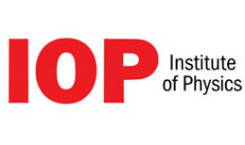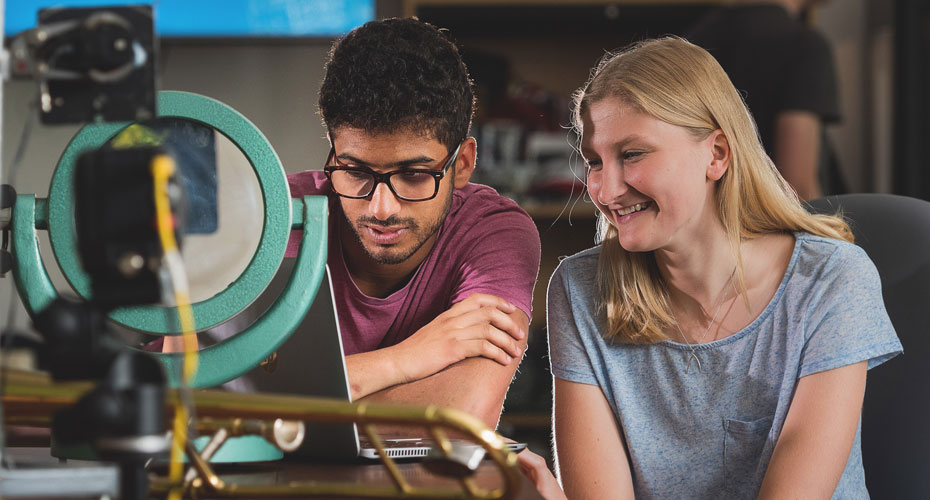| UCAS code | F326 |
|---|---|
| Duration | 4 years |
| Entry year | 2025 |
| Campus | Streatham Campus |
| Discipline | Physics and Astronomy |
| Contact | Web: Enquire online |
| Typical offer | A-Level: AAA-ABB |
|---|---|
|
A-Level: ABB-ABC |
Overview
- Accredited by the Institute of Physics, gain a solid foundation in modern physics and an understanding of modern practical and technological applications of quantum physics
- Our MPhys degree allows you to work on a real-world collaborative, open-ended research project in quantum technology. Gain first-hand experience of how modern research works and develop your skills as a professional researcher
- You’ll focus on modern physics methods and applications, equipping you with the knowledge and skills for addressing contemporary challenges in the field
- Benefit from access to advanced research facilities including advanced research and teaching labs, observatory and computer labs
- Continuous skills development programme, designed with industry partners, will enable you to craft a digital portfolio and CV to showcase your skills to potential employers.
Discover undergraduate Physics at the University of Exeter.
![]()
Top 10 in the UK for Physics and Astronomy
9th in the Guardian University Guide 2024 and 10th in The Times and The Sunday Times Good University Guide 2024
![]()
Extensive facilities in our dedicated building including advanced research and teaching labs, observatory and computer labs
![]()
We are passionate about training new physicists and believe that is done best via a supportive and inclusive student-staff environment
![]()
94% of graduates in or due to start employment/further study 15 months after graduation
Based on full-time, first degree, UK-domiciled graduates, HESA Graduate Outcomes survey 2020/21
Accreditations

All our MPhys and Single Honours BSc degrees are accredited by the Institute of Physics. Accredited MPhys degrees fully satisfy the educational requirements of the Chartered Physicist (CPhys) professional qualification.
Entry requirements (typical offer)
| Qualification | Typical offer | Required subjects |
|---|---|---|
| A-Level | AAA-ABB | A in Mathematics and B in Physics, or B in Mathematics and A in Physics |
| IB | 36/666-32/655 | HL 6 in Mathematics (Analysis and Approaches) and HL5 in Physics, or HL5 in Mathematics (Analysis and Approaches) and HL5 in Physics |
| BTEC | DDD_DDM | Applicants studying a BTEC Extended Diploma are also required to achieve Grades A and B in A Level Mathematics and Physics |
| GCSE | 4 or C | Grade 4/C in GCSE English language |
| Access to HE | 30 L3 credits at Distinction Grade and 15 L3 credits at Merit Grade - 24 L3 credits at Distinction Grade and 21 L3 credits at Merit Grade | 15 L3 credits at Distinction Grade and 12 L3 credits at Merit Grade in acceptable Mathematics and Physics subject areas. An additional Maths Test may be required. |
| T-Level | T-Levels not accepted | N/A |
| Contextual Offer | A-Level: ABB-ABC |
Specific subject requirements must still be achieved where stated above. Find out more about contextual offers. |
| Other accepted qualifications | ||
| English language requirements |
International students need to show they have the required level of English language to study this course. The required test scores for this course fall under Profile B2. Please visit our English language requirements page to view the required test scores and equivalencies from your country. |
|
NB General Studies is not included in any offer.
Grades advertised on each programme webpage are the typical level at which our offers are made and provide information on any specific subjects an applicant will need to have studied in order to be considered for a place on the programme. However, if we receive a large number of applications for the programme we may not be able to make an offer to all those who are predicted to achieve/have achieved grades which are in line with our typical offer. For more information on how applications are assessed and when decisions are released, please see: After you apply
Course content
Our programme, fully accredited by the Institute of Physics, is carefully designed around a skills development roadmap that starts on day one, and continues across your whole degree.
Your first year introduces you to the physics of everyday life and experimental physics as well as supporting you to advance your mathematical and computational data analysis skills. Alongside your physics studies, we start preparing you for your future career as a physicist by developing your professional skills.
You will have the chance to explore a variety of advanced applications of quantum mechanics, including an introduction to quantum computing, high energy phsyics, or advanced applications of solid-state physics
As you continue through the rest of the programme, you will further develop your transversal and personal skills as a future physicist through our dedicated skills development programme. You will explore more complex topics of contemporary physics, like electromagnetism, classical field theory, quantum mechanics or solid state physics.
During the last two years of your degree, you will have the chance to develop your masters project. You will work on a real-work collaborative, open-ended applied quantum mechanics research project, gaining first-hand experience of how modern research works and developing your skills as a professional researcher.
Modules
The modules we outline here provide examples of what you can expect to learn on this degree course based on recent academic teaching. The precise modules available to you in future years may vary depending on staff availability and research interests, new topics of study, timetabling and student demand.
Compulsory modules
| Code | Module | Credits |
|---|---|---|
| PHY3052 | Nuclear and High Energy Physics | 15 |
| PHY3062 | Methods of Theoretical Physics | 15 |
| PHY3064 | Nanostructures and Graphene Science | 15 |
| PHY3072 | Physics Project | 30 |
| PHY3073 | States of Matter | 15 |
| PHY3074 | Employability and Professional Skills Development III | 0 |
| PHY3075 | Introduction to Quantum Technology | 15 |
Optional modules
| Code | Module | Credits |
|---|---|---|
| Select 15 credits of options: | ||
| PHY3051 | Electromagnetism II | 15 |
| PHY3061 | The Biophysics of Cells and Tissues | 15 |
| PHY3066 | Galaxies and High Energy Astrophysics | 15 |
| PHY3068 | Principles of Theoretical Physics | 15 |
| PHY3070 | Stars from Birth to Death | 15 |
| PHY3071 | Soft Matter | 15 |
| PHY3220 | Fluid Dynamics in Physics and Astronomy | 15 |
| PHY3222 | Energy, Materials and Sustainability | 15 |
Compulsory modules
| Code | Module | Credits |
|---|---|---|
| PHYM003 | Condensed Matter II | 15 |
| PHYM009 | Project and Dissertation | 45 |
| PHYM013 | Quantum Many-Body Theory | 15 |
| PHYM015 | Quantum Optics and Photonics | 15 |
| PHYM020 | Employability and Professional Skills Development IV | 0 |
Optional modules
| Code | Module | Credits |
|---|---|---|
| Select 30 credits of options: | ||
| PHYM004 | Computational Physics and Modelling | 15 |
| PHYM005 | Independent Study | 15 |
| PHYM006 | Relativity and Cosmology | 15 |
| PHYM008 | Physical Methods in Biology and Medicine | 15 |
| PHYM012 | Solar and Extra-Solar Planets and Their Atmospheres | 15 |
Fees
Tuition fees for 2024 entry
UK students: £9,250 per year
International students: £29,700 per year
Scholarships
The University of Exeter has many different scholarships available to support your education, including £5 million in scholarships for international students, such as our Global Excellence Scholarships*. Financial support is also available for students from disadvantaged backgrounds, lower income households and other under-represented groups to help them access, succeed and progress through higher education.
* Terms and conditions apply. See online for details.
Learning and teaching
Learning and teaching at Exeter is undertaken in a variety of ways, ranging from classic style lecturing, weekly problem-solving classes, computing practical sessions, and laboratory sessions
You will be fully supported during your jurney as a student in a variety of ways, in a friendly and relaxed environment. You will have weekly skills development sessions where you will have the chance to develop the transversal skills needed for you academic, personal and professional development. They will occur in a variety of settings, ranging from full lectures to small group seminars.
You will also have access to personal academic and pastoral mentoring, fully embedded within the structure of our department.
A research and practice-led teaching
We believe that every student benefits from being part of a culture that is inspired by research and being taught by experts. Not only do we teach you about our pioneering research, we teach you how to undertake the research yourself. Experimental skills are acquired in the laboratories and astronomical observatory, and here you are introduced to a wide range of apparatus and techniques. Training in theoretical techniques is provided by our methods and computational modules. By the time you reach the start of your extended project work, you will have received the necessary preparation to undertake it with confidence in either experimental or theoretical topics, and these projects are tackled with great enthusiasm and energy.
Assessment
Assessment in Exeter is performed via a combination of exams and continuous assessments, including problem sets, reports, multimedia presentations, posters and vivas. You will be able to find a variety of modules with different approaches, ranging from 100% exam-based ones to 100% coursework ones.
Your future

Employability skills are an integral part of the physics curriculum. The flexibility and adaptability of a well-trained physicist is appreciated by employers: they acknowledge the benefits of excellent problem solving skills, an educated scientific intuition, and the confidence to be able to grasp new concepts quickly.
Our degree programmes include:
- A continuous Skills Development programme that will lead to the creation of a professional portfolio
- Extensive problem-solving skills training
- Development of group working skills
- Training in scientific communication
- Scientific data analysis training.
In addition, the purpose of the extended project work in both the BSc and MPhys programmes is for you to develop research skills. You will learn to present and scientifically defend your work and ideas in a variety of ways. The experience and skills developed not only form a valuable basis for a research career, but are also known to be highly valued by employers.
The most academically-able graduates are normally strongly encouraged to apply for a fully-funded PhD studentship in physics or astrophysics. Visit the Physics postgraduate research degrees page for details.
Career paths
The largest proportion of our graduates enter science-based industries in positions involving research and development, production and management. Other careers include scientific work in government establishments (e.g., QinetiQ or Harwell Laboratories), hospital physics in the NHS, and technical management in broadcasting and the communications sector. Some work in high-tech start-up companies.
The broad-based skills acquired during your degree will give you an excellent grounding for a wide variety of careers, not only those related to Physics but also in wider fields. Examples of roles recent graduates are now working as include:
- Academic Researcher
- Actuary Astronomer
- Chartered and Certified Accountant
- Cyber Security Professional
- Engineer
- Financial Accounts Manager
- IT Business Analyst and Systems Architect
- Programmer
- Software Developer
- Teacher











